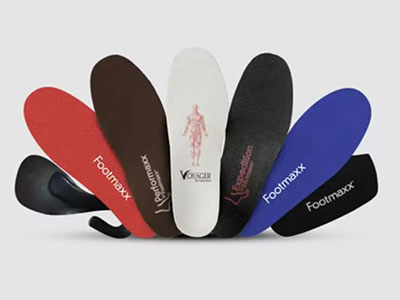
Medical grade vs. custom Footmaxx orthotics
Medical grade orthotics are basic; everyone gets the same thing – all you give is a shoe size type of orthotic. Great for people who are suffering from mild foot conditions such as heel pain, flat feet, or people who just want to enhance their overall comfort during activities like walking or standing. Medical grade orthotics are cheaper, but their lifespan is only from 12-24 months. Dr. LaCava likes to compare them to a mid-grade car that will get you from point A to point B.
For custom Footmaxx orthotics, Dr. LaCava’s DME Coordinator will perform a digital Dynamic Gait and Pressure Analysis Report that will include health history, an assessment of your height, weight, level of activity, and any medical conditions. This is key to making truly custom orthotics because it’s not the shape of the foot that causes the problem; it’s how the foot functions while bearing weight. Based on your report, Dr. LaCava will then determine what combination of top cover, cushioning, module, and bottom reinforcement is the best fit for you. Footmaxx offers a wide range of top covers for added comfort – from natural leather for a little bounce for added comfort and better absorption to wool that wicks away sweat and moisture and is designed to reduce the effects of plantar fasciitis, bunions, and other foot ailments – to everything in between. Custom Footmaxx orthotics are a little more money than the medical grade orthotics but well worth the investment, having a lifespan of 5 to 7 years depending on use.
Do you stand for long hours a day?
If you lead an active lifestyle and spend extended periods standing, you could be susceptible to overuse injuries affecting the plantar fascia, a band of tissue that runs from the heel to the toes along the underside of your foot. Using orthotics can alleviate the strain on the plantar fascia resulting from prolonged standing.
Do you have foot or heel pain?
Frequent foot pain, particularly in the morning, is often linked to wearing high heels or uncomfortable shoes, but it might indicate plantar fasciitis. Understanding that such pain signals a deeper issue rather than merely avoiding it is crucial for maintaining healthy feet and good posture.
Do you have a flat or high arch?
For collapsed arches, orthotics can provide flat arch support to help reduce the strain on the feet, ankles, and lower legs. They can also provide better balance, cushioning, and shock absorption support for high arches to reduce the impact on your feet and back. Orthotics will realign the foot and ankle for improved biomechanics and comfort.
If you find yourself answering “yes” to any of these questions, it’s time to consider scheduling an appointment with Dr. LaCava at (501) 321-4844 to explore how orthotics could benefit you.
